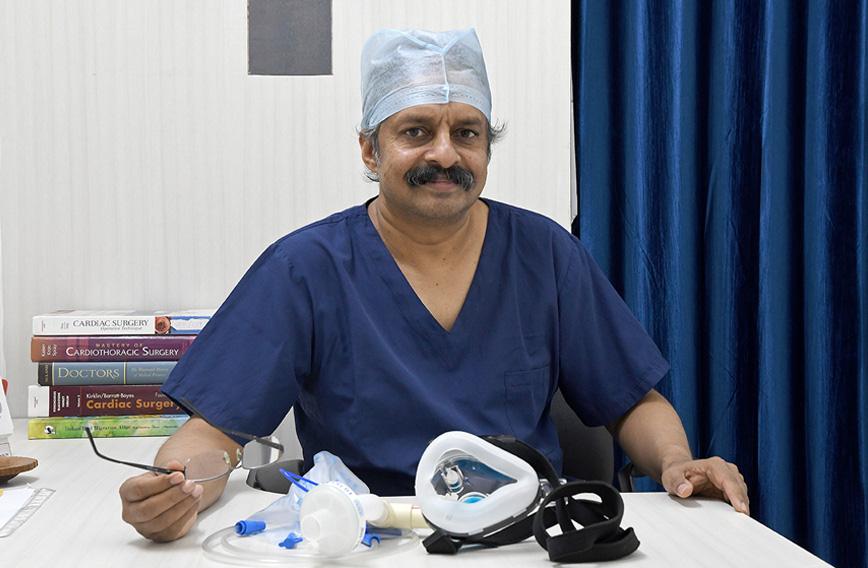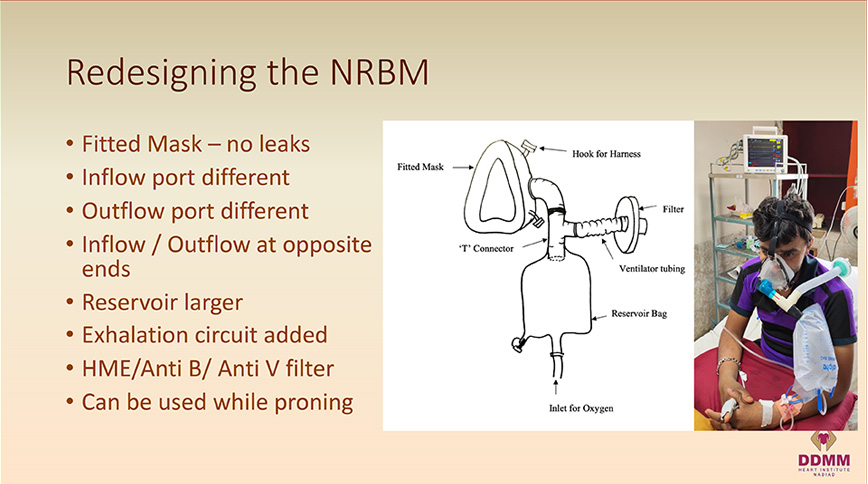
Dr Sanjeeth Peter
Heart surgeon makes mask to cut oxygen use by 50%
Civil Society News, New Delhi
A mask that can reduce by as much as 50 percent the oxygen consumed by a COVID-19 patient in hospital conditions has been devised by a cardiovascular surgeon in Nadiad, a small city in Gujarat.
Dr Sanjeeth Peter, director of the DDMM Heart Institute, had to quickly find a solution to arising demand for oxygen and shrinking local supplies of cylinders.
He had also observed that patients were consuming more oxygen in this surge of the virus. Instead of 5 litres per minute, patients were consuming 15 and 25 litres.He realized a better device and mask were needed to deliver the oxygen to the patient more efficiently.
Watch the Interview with Dr Sanjeeth Peter:
Using a urine bag, discarded plastic pipes and a filter, he set about remodeling the NRBM or Non Re-BreathableMask, which is used to give patients oxygen before they reach the stage when they require full-fledged ventilation.
“Cardiac surgeons are basically plumbers. Fixing pipes and channels is what we know to do,” says Dr Peter who took only 10 minutes to figure out what was wrong with the design of the NRBM when used under the stressful circumstances of the pandemic.
He identified several problems with the NRBM. First was that the oxygen bag had a single inlet and it was located at a right angle to the patient’s mouth and nose. This he found made it difficult to put the patient in a prone position. In a prone position the patient lies on the stomach and oxygen levels significantly improve.
He also found that the NRBM bag was made from flimsy material which could easily crumple and result in obstruction to the flow of the oxygen, especially if proning were attempted.
Dr Peter decided instead to use an ordinary urine bag, which was made of stronger material. Instead of a single inlet, he provided for an inlet in much the way a urine bag functions.
He could now position the bag in front of the patient instead of at a right angle. The patient could then be placed on the stomach quite easily for proning, which would not only increase oxygen saturation but reduce the demand for oxygen.
There were other innovations as well. The NRBM has openings on two sides when it is strapped on to the patient. The result is that the patient doesn’t get all the oxygen that flows into the mask. A lot of it escapes and together with it the virus that the patient breathes out.
Dr Peter changed the mask to one which completely sits on the nose and mouth with the exhaled air going through the outlet in the bag. To prevent infection from spreading, he fitted a pipe with a filter to the bag’s outlet

The re-modelled NRBM resulted in oxygen consumption by a patient going down by as much as 50 per cent, says Dr Peter. So, if a patient was beginning to draw 15 or 20 or 25 litres per minute of oxygen as he had observed, with the modifications the consumption came down to 8 or 9 litres per minute. The NRBM is normally used when a flow of 5 litres or more is needed. But something about the virus in this second surge was making patients draw more oxygen than expected.
Dr Peter cautions that there are also downsides to his innovation and that it should be used under supervision in a hospital environment.
A problem that can arise is an increase of carbon dioxide within the environment of the mask. A watch therefore has to be kept on the patient to make note of drowsiness or weakness.
Another problem is that since the mask sits tightly on the patient’s face, it can leave marks if used for a long time.
Indian doctors working in villages and small towns are known to come up with innovations to deal with the challenges they face locally. Rural surgeons are known to have come up with surgical procedures which their counterparts in big cities wouldn’t imagine as being possible.
Dr Peter qualified as cardiac surgeon from the Christian Medical College in Vellore. He has a fellowship from Australia. But he has chosen to work in Nadiad since 1996 because he feels that his skills are most needed in these remote parts of Gujarat.
The DDMM Heart Institute is an inter-faith initiative between the Methodist Church and the local community which wished to remember their popular Member of Parliament, Dharamsinh Desai, who died of a heart attack. It does more than 300 heart surgeries in a year and has an awesome reputation in Nadiad and nearby for quality heartcare.
Comments
-

Dr G Ravindra babu - June 1, 2021, 2:36 p.m.
would like to talk with Dr Sanjeeth Peter to clear some doubts My number 98481 89289
-

Dr.m.s. Choudary - May 31, 2021, 10:53 p.m.
Appears useful. Cost please
-

Patrick rosario - May 26, 2021, 10:31 p.m.
Awesome innovation Let’s hope some medical device company works with dr Peter and distributes this delivery system worldwide
-

geeta - May 20, 2021, 5:40 p.m.
Such dedicated professionals are the lifelines of our country's well-being...Need many such small innovations which are affordable and accessible to the large population, especially in these times of distress..
-

Samira Sinha - May 19, 2021, 3:26 p.m.
What a cost effective and innovative measure. May God keep all our doctors safe. Especially those like Dr. Peter
-

mustafa moochhala - May 19, 2021, 9:45 a.m.
what a lovely, needed innovation!
-

Walter VIEIRA - May 19, 2021, 7:31 a.m.
What an innovative idea ! Our admiration for Dr Peters and gratitude . I hope this is now picked up fast and made available and popular throughout the country , at a time when the need is so great .
-

Chandralekha Anand Sio - May 18, 2021, 11:07 p.m.
A good innovation by Dr.Peter but requires further improvements to improve its limitations. Such new developments should be encouraged.
-

Nanjappa. - May 18, 2021, 9:31 p.m.
Congrats Doctor . That's the way to go . Wish you all the very best.



